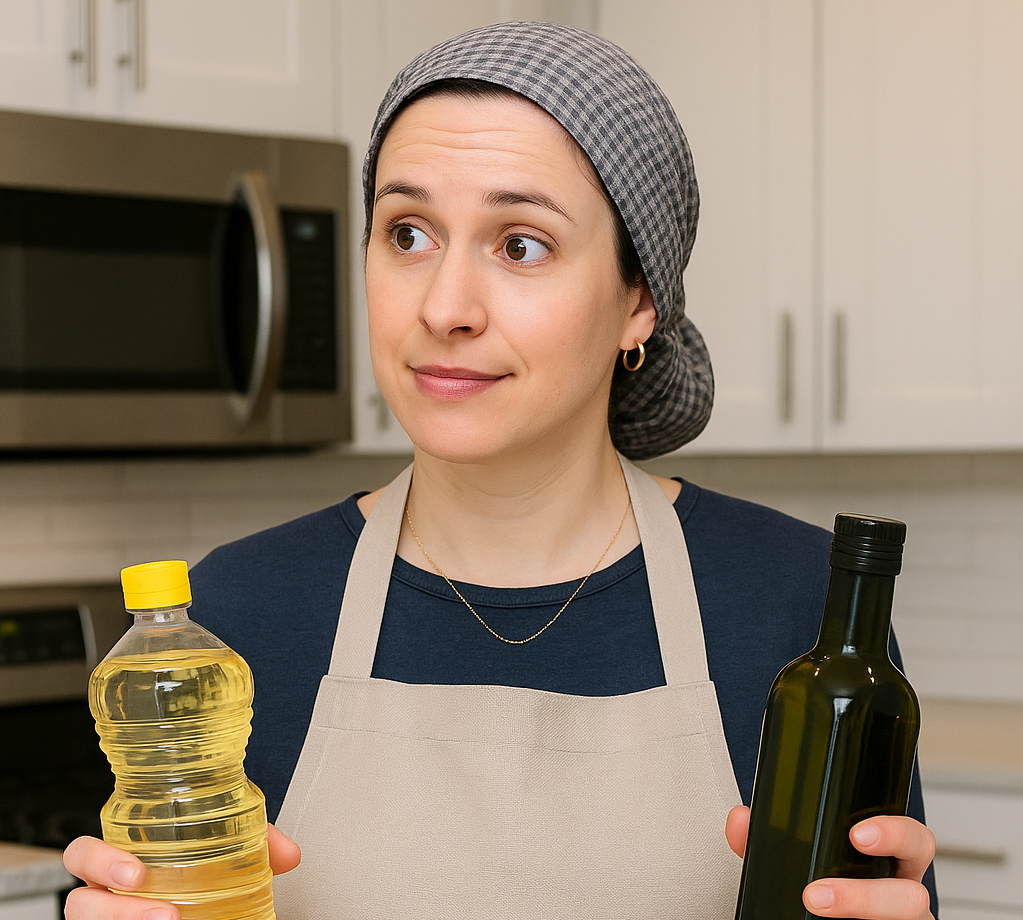
The Truth About Cooking Oils: Better, Not Perfect
Share
At KedushaKids, we focus on holistic and general health and education. I strongly believe that a mommy’s knowledge is powerful — it shapes the entire home. Surrounding our children with Aleph Beis letters and educational content nurtures their growth in a gentle, wholesome way.
One thing I’m passionate about is not doing things just because they’re a fad. I wanted to know the truth — is coconut oil actually healthy? Is it okay to fry my delicious schnitzel that my kids love? Am I poisoning them by making cake with canola oil?
After doing extensive research (ahem — thanks ChatGPT 😄), I found out that my hunch was right. I learned so much from this study, and below is a simple summary — mom to mom — of what really matters. If you want to dig into all the details, I’ve included a link to the full research document at the end.
🩺 Finding Balance: Health Without the Extremes
Something I’ve noticed in the health world is that it’s often very all-or-nothing. Either it’s about “the purest, best” of everything — or about calories, macros, and dieting. But for moms trying to feed real families and juggle budgets, that kind of perfection just isn’t practical.
There’s a big difference between knowing what’s best and what’s better. And better is often where the mitzvah of health really lives — in the balance between caring for our bodies and living real life.
I get put off when health advice turns extreme — like when people act as though frying food is automatically bad. Let’s be honest: our kids love schnitzel. If we fry it once a week at home, in clean oil and with care, that’s not “poison.” That’s nourishment and family time.
The truth is, the problem isn’t the frying — it’s how we fry. Home-fried foods made with fresh oil, moderate heat, and quality ingredients are completely different from industrial fried foods that use old, overheated oil.
And when I see soybean oil in my local bakery, it makes me wonder: is it really bad, or is it just used carelessly? Some oils, like soy or canola, can be fine when they’re expeller-pressed or high-oleic, but less ideal when they’re industrially refined.
What I want every mom to know is: you don’t have to panic. Just learn where each oil belongs. Spend more on the good stuff (like olive oil for salads and sautés), and use budget oils (like canola or sunflower) for baking and frying. You’re allowed to be normal and still be healthy.
❤️ A Note on Healthy Fats & Hormones
Here’s something we don’t talk about enough: our bodies need fat — especially as women.
Healthy fats support hormone balance, steady energy, and even weight regulation.
Hormones like estrogen and progesterone are made from cholesterol and fatty acids, and fats help the body absorb vitamins like A, D, E, and K. When we avoid fat completely, our bodies often feel stressed, our blood sugar spikes faster, and our energy dips.
That’s why you might notice — just like I did — that adding natural fats such as butter, eggs, or a bit of beef or chicken fat can actually help you feel more balanced. When I had gestational diabetes, pairing my eggs with butter kept my blood sugar stable in a way olive oil didn’t. Fats slow down digestion and flatten blood sugar spikes, helping the body feel calm and nourished.
This doesn’t mean saturated fats are “better” than unsaturated fats — it means we need a mix of both. Olive oil and avocado oil give us heart-healthy monounsaturated fats; butter, beef fat, and coconut oil provide the saturated fats that support hormones and cellular strength.
In kosher homes, it’s normal to use chicken fat or beef fat during Pesach or for traditional dishes — and that’s okay. As long as it’s from real, wholesome sources and not overheated or reused, it’s part of a healthy, balanced diet.
The key is variety and intention:
🫒 Olive oil for antioxidants,
🥑 Avocado and nuts for heart health,
🍳 Natural animal fats for hormones and stability.
Healthy eating isn’t about cutting out fat — it’s about using it wisely and gratefully.
🌿 Part 1: Debunking the Hype — Better, Not Perfect
The goal isn’t perfection — it’s smarter swaps. Here’s what matters most:
-
Use fresh oil — never reuse it.
-
Match the oil to the heat and purpose.
-
Favor oils rich in monounsaturated fats (olive, high-oleic canola/sunflower).
-
Don’t overpay for fancy bottles that add no extra benefit.
🍳 Part 2: Quick Compare — What to Use, When, and Why
|
Oil Type |
Best Use |
Why It’s Good |
|
Extra Virgin Olive (EVOO) |
Sautéing, roasting, dressings |
Rich in antioxidants & monounsaturated fats; stable at normal heat |
|
Refined Olive (“Light”) |
High-heat searing, neutral taste |
Fewer nutrients but higher smoke point |
|
Canola (Regular) |
Baking, light frying |
Neutral flavor, omega-3 ALA, affordable |
|
Canola (High-Oleic) |
Deep-fry or high-heat use |
More stable at high temps, less oxidation |
|
Sunflower (Regular) |
Baking, mild sauté |
Light taste, vitamin E source |
|
Sunflower (High-Oleic) |
Roasting, frying |
Higher heat stability, neutral |
|
Avocado (Refined) |
High-heat cooking |
Very stable, mild flavor (pricey) |
|
Avocado (Unrefined) |
Dressings, medium heat |
Keeps antioxidants, buttery flavor |
|
Coconut (Virgin/Refined) |
Specific recipes, solid-fat swap |
Stable but high in saturated fat — occasional use |
Quick Rule:
-
EVOO → everyday cooking & salads
-
Canola → neutral baking & budget cooking
-
High-oleic sunflower/canola → high-heat or frying
-
Coconut → flavor-specific or once-in-a-while
🔬 Part 3: The Real Science — Closing the Myths
-
Seed oils aren’t “toxic.” The problem is poor processing or reusing oil. When used fresh and not overheated, canola and sunflower oils are safe and heart-healthy.
-
EVOO can handle heat. Studies show extra-virgin olive oil stays stable at normal cooking temps.
-
Refined doesn’t mean poisonous. Refined olive oil and canola both go through industrial steps, but what’s left is mostly pure fat — not chemicals.
-
Coconut oil isn’t a miracle. It’s stable, yes — but high in saturated fat.
-
Avocado oil isn’t magic. It’s great, but not dramatically healthier than high-oleic canola or refined olive oil for the price.
🛒 Practical Tips for Every Kitchen
-
Look for “High-Oleic,” “Expeller-Pressed,” or “Cold-Pressed” on labels.
-
Store oils in a cool, dark cabinet, tightly sealed.
-
Don’t reuse oil from frying.
-
Save the pricey EVOO for salads, dips, and drizzles; use budget oils for baking and frying.
-
Remember: a calm, informed mom makes healthier choices than a fearful one.
💬 Final Thought
It’s not about chasing trends — it’s about understanding balance. You’re doing a beautiful job caring for your family, and being informed helps you do that with confidence.
👉 Click here to read the full research paper — complete with scientific sources, fat breakdowns, and brand recommendations.
